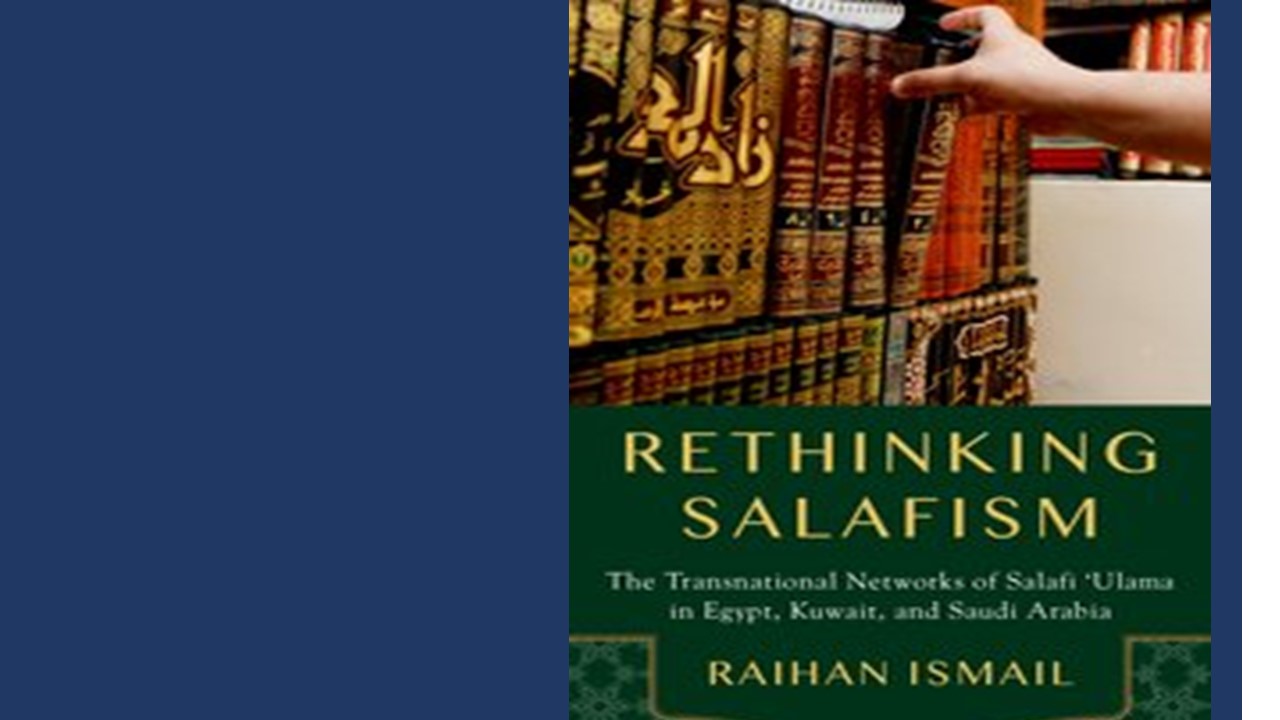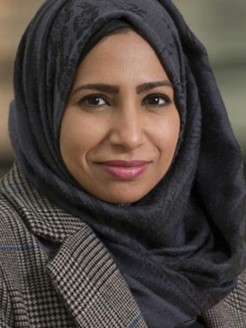
- 26 May 2022
[Book Talk] Rethinking Salafism: The Transnational Networks of Salafi ‘Ulama
(This event is organised by MEI DOI – Gulf research cluster.)
Despite receiving scrutiny as the one of the main ideological sources for extremist violence perpetrated by jihadi groups, Salafism is not monolithic. Looking beyond the literature discussing transnational jihadi networks, Dr Raihan Ismail examines how quietist and activist Salafi clerics work across borders to preserve and promote what they deem “authentic Islam”. In this talk, Ismail focuses on the ‘ulama of three countries – Egypt, Kuwait and Saudi Arabia – and unveil how they have taken to the cyber domain to publicise their views.
While quietist Salafis endorse an apolitical tradition and denounce political activism, haraki, or activist, Salafi clerics advocate peaceful political change. Dr Ismail reassesses existing Salafi typology, offering new categorisations of Salafi clerics in their attitudes towards sectarian matters, and when dealing with social change. Drawing upon publications, religious rulings and cyber-ethnography, her book, Rethinking Salafism, lays out how the ʿulama cooperate to foster a collective Salafi identity based on their political, theological, and jurisprudential positions.
This public talk was conducted online via Zoom on Thursday, 26 May 2022, from 5.00 pm to 6.00 pm (SGT).
Photo Image: Book Cover of Rethinking Salafism: The Transnational Networks of Salafi ‘Ulama
Listen to the full event here:
Watch the full event here:
Read the Summary of Event Proceedings:
By Simran Kaur
Intern, Middle East Institute, National University of Singapore
Rethinking Salafism: The Transnational Networks of Salafi ‘Ulama in Egypt, Kuwait, and Saudi Arabia was published last October. While working on her first book, Saudi Clerics and Shia Islam, Dr Raihan Ismail found herself intrigued by the categorisation of Salafism. In her examination, she realised that the typology of Salafism deserved reassessment and was led onto this project.
Dr Ismail had three goals:
- Explore the transnational networks of clerics, their origins, and the ways in which they collaborate with one another. She particularly focused her research on three countries: Saudi Arabia, known as the face of modern Salafism; Kuwait, which has a smaller albeit internationally active Salafi community; and Egypt, where Salafi clerics are celebrated.
- Examine how local circumstances may influence the stability of the networks of these clerics.
- Reassess the current typology of Salafism, as she feels the existing categorisation does not accurately reflect the attitudes of Salafi clerics.
Dr Ismail elaborates on the anatomy of the Salafi movement as it is contemporarily categorised. In her book, she does not focus on Jihadists as she feels it is a topic extensively discussed:
- Quietists: These individuals eschew direct political participation. They typically support the state.
- Activists: These individuals are vocal and discuss political issues. They serve as a religious vanguard and strongly retain their Salafi beliefs, but refrain from violence.
- Jihadists: These are militants who subscribe to Salafi concepts. They believe violence is justified to realise their objective of returning to “true Islam”. The group is largely denounced by mainstream Salafism.
Dr Ismail noticed that most Salafi clerics were frequently travelling between Egypt and Saudi Arabia. Salafism is considered by its adherents as the purest Islam. She explains that because of this theological closeness, Salafis were able to foster relations with Saudi Arabia. Salafi clerics, especially those that had travelled from Egypt, began to occupy important positions in Saudi Arabia. Overall, this demonstrates the transnational connection amongst Salafis.
While the Muslim Brotherhood held political power in Egypt, the Salafis in Egypt practised political quietism. Dr Ismail explained that they were content with directing their energies towards prayer and rituals of authentic Islam. They were also largely supportive of the Saudi state. During the first Gulf War for example, when Iraq invaded Kuwait, activists in Kuwait were outraged and questioned Saudi’s allowance of US troops on their soil. Contrastingly, Egyptian quietists wrote in support of Saudi Arabia. On this basis, Dr Ismail explains that pre-existing transnational networks influence the political quietism of Salafis in Egypt. However, local circumstances have the ability to influence these attitudes. Following the overthrowing of Hosni Mubarak during the Egyptian Revolution of 2011, Salafi quietists began to criticise the Muslim Brotherhood and Mubarak’s regime. In Dr Ismail’s view, they were compelled by the changing circumstances to demonstrate an interest in politics and power.
Dr Ismail contrasts the local conditions in Egypt with that of Saudi Arabia. She argues that with regard to supporting policies put forth by Crown Prince Mohammed bin Salman (MBS), clerics in Saudi Arabia have very little choice. There have been reports of the royal family arresting individuals who even question their authority and due to this risk, Salafi clerics have little opportunity to be vocal. However, she recognises that the crown prince does, in fact, have many genuine supporters. Nonetheless, there is an entirely different environment in Saudi Arabia that dictates the attitude, actions, and even agency of Salafi clerics.
In the discussion of Saudi Arabia, Dr Ismail also explores the promotion of moderate Islam under MBS in her book. For more than two centuries, Wahhabism has been Saudi Arabia’s dominant fate, following a literalist and puritanical approach to Islamic theology and law. In current discourse, the terms “Salafi” and “Wahhabi” are often used interchangeably. However, Saudi Arabia has since turned the page on Wahhabi Islam as its state ideology. Dr Ismail cites MBS declaring this aspect of the kingdom as “out of date” and seeking to reconstruct the Saudi identity to move away from such extremism and propel towards social liberalisation instead. She explains that while some clerics are critical of him, many acknowledge the need to transition from certain traditions of the past.
Q&A Session
Could you elaborate on how various Salafis have discussed democracy and parliamentarianism in practice in recent times, such as how they view Kuwait’s parliamentary system and how they engage with electoral politics in Egypt?
Dr Ismail explained that activist Salafis in Egypt view democracy as a western construct. Hence, if Egypt practices democracy, it is a Western imposition on Muslim society. In the post-Mubarak era, Salafis still haven’t accepted democracy as a legitimate political process. Still, they acknowledge that they will have to participate in it in order to harness the power needed to Islamise Egyptian society.
In the context of Kuwait, Dr Ismail cites a group that promotes political quietism while simultaneously agreeing that participating in the political system is necessary to promote Islamic principles. Thus, the general attitude of Salafis on democracy on parliamentarianism is not positive but it is seen as a necessary evil to implement changes in society.
What troubles Islam and how have you attempted to tackle this question in your book? For example, how is the embrace of technology being received by Salafi clerics?
The Salafis believe that deviation is a problem. They often quote the Prophet: “beware of newly invented matters, for every invented matter is an innovation and every innovation is going astray, and every going astray is in hell-fire.” This sentiment is popular in sermons and religious ruling. However, Dr Ismail has come to realise that it also depends on how you define innovation. In Saudi Arabia, many Salafis argue that technology is acceptable and it is only religious innovation that is problematic (e.g. the way you pray, Sufism, etc.).
About the Speakers

Senior Lecturer
Centre for Arab and Islamic Studies, Australian National University
[Moderator] Dr Clemens Chay
Research Fellow
Middle East Institute, NUS
Dr Raihan Ismail is a senior lecturer at the Centre for Arab and Islamic Studies, Australian National University. She was a Discovery Early Career Researcher (DECRA) Fellow from 2019-2022. She was the co-recipient of the Max Crawford Medal in 2018, awarded by the Australian Academy of the Humanities.
Dr Ismail is the author of Saudi Clerics and Shia Islam published by Oxford University Press in 2016. Her latest book, Rethinking Salafism: The Transnational Networks of Salafi ‘Ulama in Egypt, Kuwait and Saudi Arabia, was published by the Oxford University Press in 2021.
Dr Ismail has been the co-convenor (2015-2018) and convenor (2019-2020) of the Political Islam seminar series for various Commonwealth government agencies, including AGD and Defence. She is a regular commentator in the Australian and international media on Islam and Middle East politics and appeared as a panelist on the ABC’s Q&A programme. In 2019, she was placed in the ABC’s Top 5 Media Residency Programme for humanities scholars.

[Moderator] Clemens Chay is a research fellow at the National University of Singapore’s Middle East Institute. At MEI he spearheads a public education series entitled “Bridging the Gulf”. His research focuses on the history and politics of the Gulf states, with a particular emphasis on Kuwait, Oman and Saudi Arabia. Prior to joining MEI, he was the Al-Sabah fellow at Durham University, where he taught at and completed his PhD as well. His most recent academic publications include a chapter that examines Kuwait’s parliamentary politics in The Routledge Handbook of Persian Gulf Politics (2020) and another article appearing in the Journal of Arabian Studies, The Dīwāniyya Tradition in Modern Kuwait: An Interlinked Space and Practice. His commentaries also feature across different outlets, including ISPI, KFCRIS and AGSIW. Dr Chay is currently working on a book project related to Kuwait’s diwaniyya circuit.




